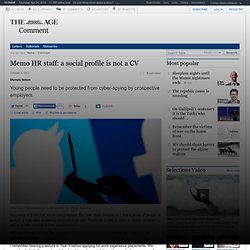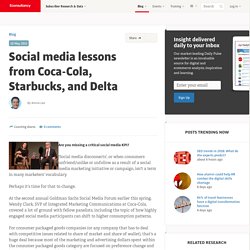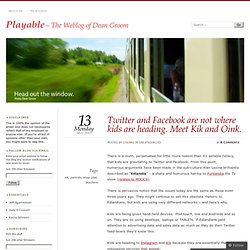

Www.edutopia.org/pdfs/edutopia-anderson-social-media-guidelines.pdf. Online Learning. Memo HR staff: a social profile is not a CV. 'How moral this espionage is still worries me.' Photo: Reuters It's creepy to think that you're being stalked.

But how much creepier is it that a group of people sit around a long table analysing information on your Facebook profile in order to decide whether you're worthy of a job in their organisation? Not only are we told that this repugnant practice occurs but it's promoted as a reality in the education system. I remember hearing a lecture in Year 9 before applying for work experience placements.
The presenter, ignoring the boys, said words along the lines of ''now you girls have all sorts of profile photos. Advertisement My classmates were terrified at this order and surely enough went home and deleted photos. In all this, there's an assumption that snooping on our social pages is legitimate. These excellent principles, however, fail to be honoured in one circumstance: when it concerns young people. Instead of going after youth, why doesn't the government protect them?
How to Create Social Media Guidelines for Your School. Social media lessons from Coca-Cola, Starbucks, and Delta. Are you missing a critical social media KPI?

'Social media disconnects', or when consumers unfriend/unlike or unfollow as a result of a social media marketing initiative or campaign, isn't a term in many marketers' vocabulary. Perhaps it's time for that to change. At the second annual Goldman Sachs Social Media Forum earlier this spring, Wendy Clark, SVP of Integrated Marketing Communications at Coca-Cola, covered a lot of ground with fellow panelists, including the topic of how highly engaged social media participants can shift to higher consumption patterns. For consumer packaged goods companies (or any company that has to deal with competitive issues related to share of market and share of wallet), that's a huge deal because most of the marketing and advertising dollars spent within the consumer packaged goods category are focused on preference change and increasing consumption of the product.
Major brands don’t have an awareness problem. Overconsumption among loyalists The L word. Twitter and Facebook are not where kids are heading. Meet Kik and Oink. There is pervasive notion that the issues today are the same as those even three years ago.

They might continue to sell this obsolete rhetoric to Edlandians, but kids are using very different networks – and here’s why. Kids are being given hand-held devices. iPod touch, low end Androids and so on. They are no using desktops, laptops or TABLETs. If Edlandians paid attention to advertising data and sales data as much as they do their Twitter feed-bowls they’d know this. Kids are heading to Instagram and Kik because they are essentially the two messaging services that appeal. Instagram being the ‘selfie’ universe that screams “I am am here” and Kik the natural successor to MSN Messenger, saying “I belong”. On signing up for Kik, it will go off and find your friends from other places. Kids are interested in friend based networks. Intragram says “I am here” and Kik’s multi-participant ‘group’ conversations say “I belong” – or more worryingly, I’m an outcast.
Why is Kik not like Twitter? Yes.